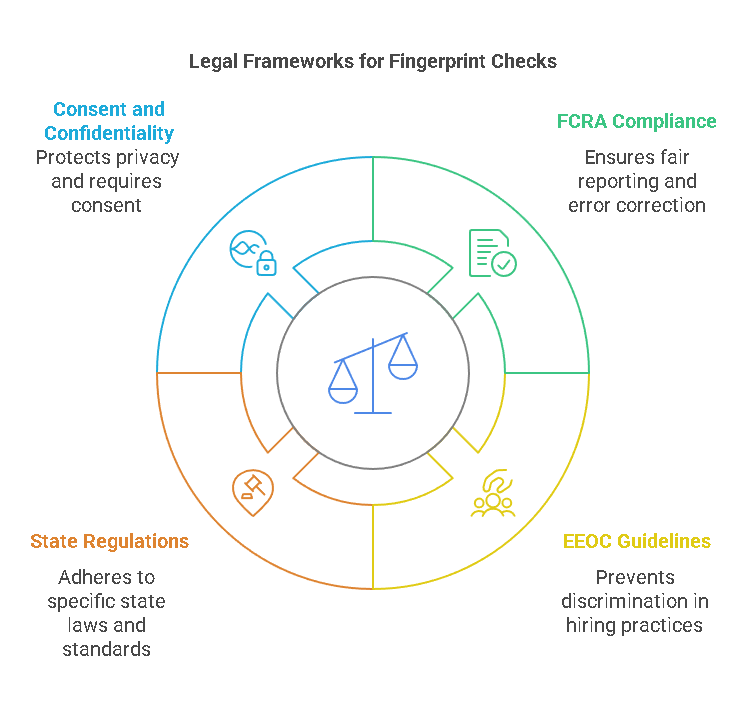Everything You Need to Know About Fingerprint Background Checks for Employment
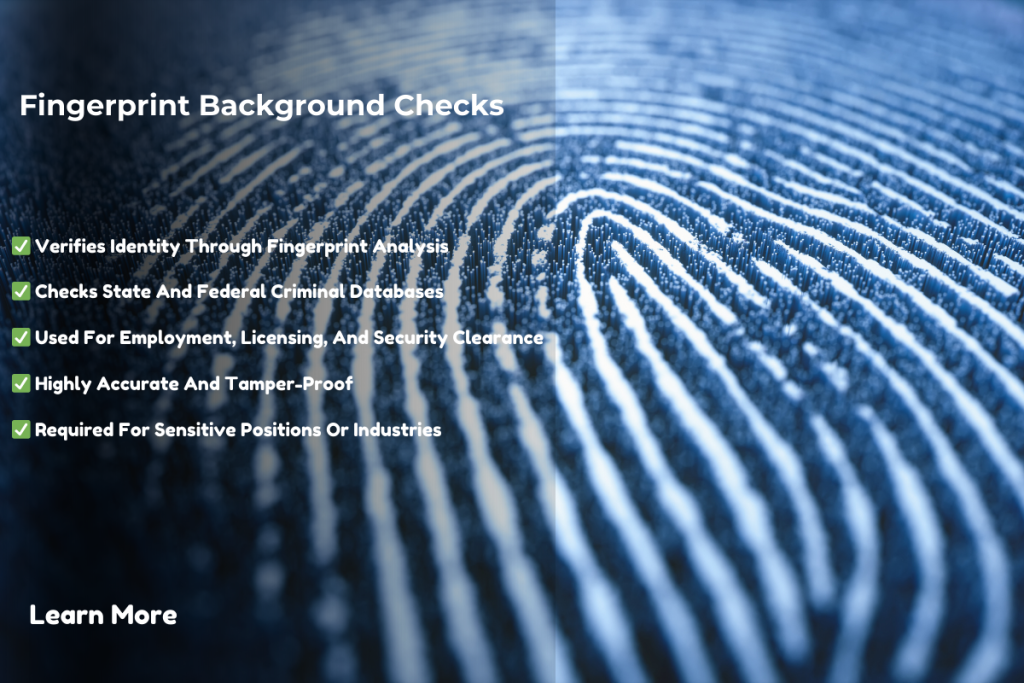
Understanding Fingerprint Background Checks: A Comprehensive Guide
What is a Fingerprint Background Check?
A fingerprint background check is a specialized form of criminal background screening that involves capturing an individual’s fingerprints and submitting them to a law enforcement agency, such as the FBI or state police, for analysis. The primary goal of this check is to assess an individual’s criminal history, if any, by comparing the submitted fingerprints against criminal records stored in a database.
Unlike traditional name-based background checks, which rely on a person’s name, date of birth, and other personal details, a fingerprint background check is based on the unique patterns in a person’s fingerprints. This makes it far more reliable and accurate, as no two people have the same fingerprint, not even identical twins.
In the fingerprinting process, the individual’s fingerprints are captured through either ink-based methods or digital fingerprint scanners, which are then sent to a central agency for review. The results returned after the fingerprint comparison will reveal any criminal records associated with those prints, ensuring a thorough and precise background check.
Why are Fingerprint Background Checks Used?
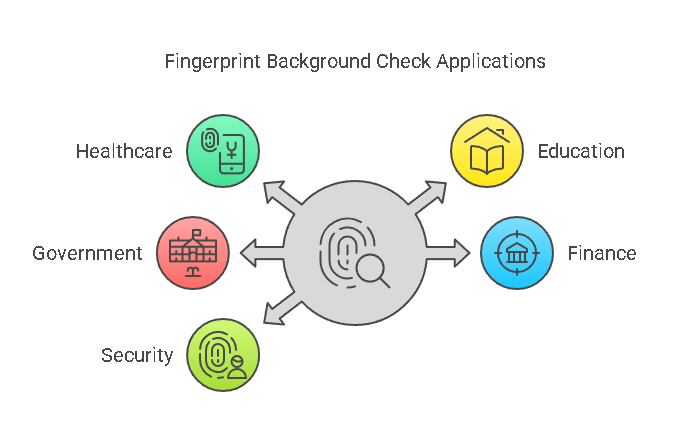
Fingerprint background checks are widely used in industries and sectors where safety, security, and trust are paramount. These industries often require more in-depth screening to ensure that individuals with criminal records do not get hired for sensitive positions. Some of the key sectors that often require fingerprint background checks include:
- Healthcare: Healthcare providers, especially those who work with vulnerable populations like children, the elderly, and people with disabilities, often need to undergo fingerprint checks to ensure they have no history of abuse or criminal activities.
- Education: Teachers, school staff, and daycare workers are required to undergo fingerprint background checks to prevent individuals with criminal records, particularly those involving minors, from being hired in these sensitive roles.
- Government: Federal, state, and local government jobs often mandate fingerprinting to protect national security and public trust, especially in roles that require access to sensitive data or facilities.
- Finance: Financial institutions use fingerprint background checks to prevent fraud and ensure that employees handling sensitive financial data are trustworthy and do not have a history of financial crimes.
- Security: Security personnel working in areas such as airports, military bases, or high-security buildings must undergo fingerprint background checks to verify their trustworthiness and clearances.
The Role of Fingerprints in Security and Identification
Fingerprints have long been used as a tool for identification, with their origins in the early 20th century when the first fingerprint database was developed. Fingerprints are unique to each individual, which makes them an incredibly powerful tool for verifying identity and ensuring that people are who they claim to be.
In a fingerprint background check, the security and accuracy of fingerprinting offer a more reliable method of identification compared to traditional methods. While names and other identifying details can be similar or even the same across multiple individuals, fingerprints provide a distinct, biometric identification that can help to eliminate errors or fraud.
The significance of fingerprint-based identification lies in its uniqueness, making it an invaluable resource in ensuring that individuals are accurately vetted for employment or security purposes. As part of the identification process, fingerprints are checked against national criminal databases, ensuring that a comprehensive evaluation of a person’s criminal history is completed.
How Fingerprint Background Checks Work: A Detailed Overview and Services
The Process of Fingerprint Background Checks
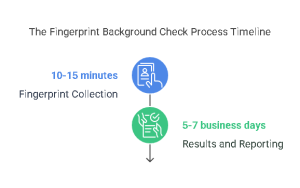
A fingerprint background check is a systematic process that involves capturing an individual’s fingerprints and submitting them to law enforcement agencies to be compared against criminal databases. Below is a step-by-step breakdown of how the fingerprint background check process typically works:
Step 1: Fingerprint Collection
- The process begins with the collection of fingerprints. This can be done in several ways:
- Ink-Based Method: Traditional fingerprinting with ink on paper, though this method is less common today due to the advancement of digital technology.
- Digital Scanning: A more modern approach where fingerprints are captured through an electronic scanner. The digitized prints are immediately sent to the appropriate authorities for processing.
The fingerprinting process generally takes about 10-15 minutes for an individual, with digital fingerprinting being quicker and more accurate.
Step 2: Submission to Authorities
- After the fingerprints are collected, they are submitted to a criminal database for comparison. This can be done through various authorities, including:
- FBI: For federal-level checks, typically used for national security and positions involving access to sensitive information.
- State Police: State-level checks are more common for positions within a particular state or for state licenses, such as teaching or healthcare certifications.
The submission of fingerprints to the authorities is done electronically or via physical mail, depending on the facility and service provider.
Step 3: Processing and Checking
- Once the fingerprints are received, the relevant authorities process the prints and compare them against existing records in national or state criminal databases. The authorities will search for any criminal history linked to those fingerprints.
- Matching Process: The fingerprint comparison is based on unique biometric data, including ridges, loops, whorls, and other fingerprint patterns.
- Criminal Record Check: If a match is found, any criminal records associated with the fingerprint will be flagged, including arrests, charges, and convictions.
Step 4: Results and Reporting
- After the authorities complete the comparison, the results are typically sent to the requesting entity (employer, licensing board, etc.). This process can take anywhere from 5 to 7 business days, though expedited services are available depending on the urgency of the request.
- The report will detail any criminal history associated with the fingerprint, allowing employers and organizations to make informed decisions.
- If no criminal record is found, the report will state that the individual has no criminal history associated with their fingerprints.
Why Fingerprint Background Checks are Essential for Employers
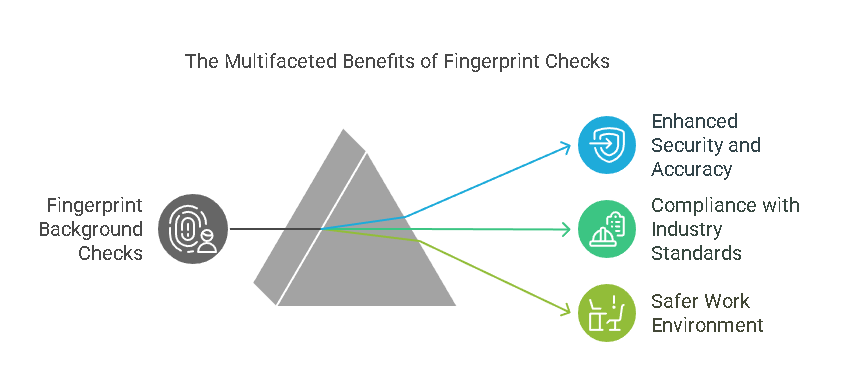
Fingerprint background checks provide several critical benefits to employers, particularly those in industries where safety, trust, and compliance are essential. Here are some reasons why employers opt for fingerprint background checks:
1. Enhanced Security and Accuracy
- Fingerprints offer the highest level of accuracy when identifying individuals, which helps employers ensure that the person they are hiring or working with is who they say they are.
- Unlike traditional name-based checks, fingerprint background checks eliminate the risk of mistaken identity and provide a more reliable method of screening candidates.
2. Compliance with Industry Standards
- Certain industries, such as healthcare, education, and financial services, often require fingerprint background checks for compliance purposes. For example, in the healthcare industry, fingerprint checks are crucial to ensure that employees do not have a history of abuse, fraud, or other offenses that could harm patients or the organization.
- Employers who hire for roles that involve working with children, vulnerable adults, or sensitive data are typically required to conduct fingerprint background checks by law.
3. Safer Work Environment
- By screening candidates thoroughly with fingerprint background checks, employers can help ensure that their workplaces are safe, secure, and free from individuals who might pose a risk to others.
- In sectors like law enforcement, education, and finance, fingerprint checks prevent individuals with a criminal history from being hired in roles that could jeopardize public safety or trust.
Precisehire Services for Fingerprint Background Checks
At Precisehire, we offer streamlined, professional fingerprint background check services tailored to businesses of all sizes. Our services ensure that your hiring process is compliant, accurate, and efficient. Here’s how we can assist:
1. Quick and Reliable Screening
- Precisehire uses state-of-the-art digital fingerprinting technology to provide accurate and rapid fingerprinting services. This ensures a fast turnaround for businesses that need background checks to move quickly.
2. Nationwide Coverage
- We work with the FBI and state authorities to ensure that your fingerprint background checks cover both national and state-level criminal records. This comprehensive approach ensures that no stone is left unturned when vetting candidates.
3. Customizable Solutions
- Whether you need to conduct a fingerprint background check for a single candidate or for a group of individuals, Precisehire offers scalable solutions that suit your business’s needs.
4. Compliance and Security
- We adhere to all legal requirements, including the Fair Credit Reporting Act (FCRA), and ensure that all fingerprint background checks are conducted in a secure and confidential manner. We also provide the necessary documentation for compliance purposes, allowing businesses to maintain transparency and accountability.
Data Table: Fingerprint Background Check Process
| Step | Description | Timeframe |
|---|---|---|
| Fingerprint Collection | Collecting fingerprints via ink or digital scan. | 10-15 minutes |
| Submission to Authorities | Sending fingerprints to relevant authorities (FBI, state police). | Immediate to 1 day |
| Processing and Checking | Authorities process the fingerprints and check criminal databases. | 3-5 business days |
| Results and Reporting | Returning the results to the employer or requester. | 5-7 business days |

